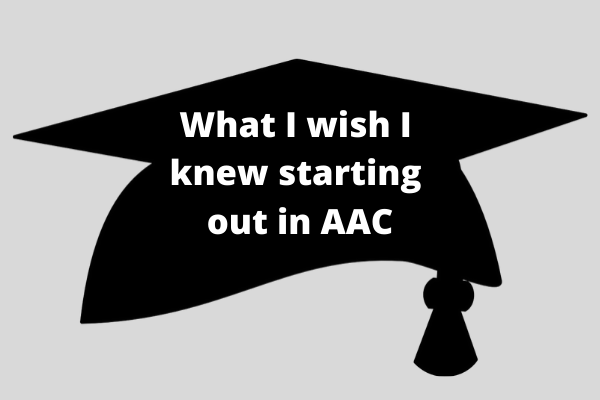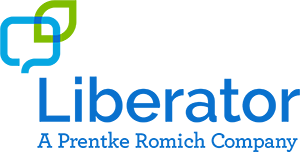What I wish I knew starting out in AAC

We asked our experienced clinicians and consultants what they wish they knew when they first started working in AAC. We all start at the same place but boy would it be great if we could get a leg up when first starting out.
Our hope is that you can use these insights to guide your own personal learning.
- I wish I knew that good AAC intervention isn’t “requesting”.
The phrase "more than requesting" is known to nearly all speech pathologists nowadays. The well known Hanen training has instilled this in us. However, for those who haven’t forked out thousands of dollars, the question remains - what is this "more”?
When you’re unsure how to approach AAC intervention, it is far too easy to simply focus on requesting. This is even encouraged with some of the most prominent AAC approaches (e.g. picture exchange systems).
Why is it important to know that AAC isn’t just about requesting? Because it shows you have a good understanding what language use and mastery really is! By the age of 2, children are already using language for language functions including; requesting, describing, directing, commenting, negating, rejecting, interjecting and much more!
How often do we limit the language growth of our clients simply because we solely focus on requesting?
- I wish I knew where to get clinical supervision from.
Our staff reflected that we all received good clinical supervision in our early days when starting out. This was crucial for establishing good practice. If you are lucky enough to have good leadership structures in your work place with clear clinical supervision you will be much better off and so will your clients!
If you don’t, then this could be the most important task for you to follow up on. Where do you get clinical supervision though?
- If your practice doesn’t have a good clinical supervision structure, speak to leadership about setting this up. Perhaps they would be willing to fund this externally.
- Check out the SPA website and go to “clinical supervision” to learn more https://www.speechpathologyaustralia.org.au
- Join an AAC related Facebook group/s to see who is actively participating and spark up a relationship there.
- Reach out to practices in your area and ask them if you could start a supervisory relationship with them (paid of course!)
- You can also get in touch with Liberator and access clinical supervision through us. We offer supervision through our training manager Leanna Fox, https://liberator.net.au/therapy/clinical-supervision
- I wish I knew how to assess AAC clients well.
We all know that good intervention starts with good assessment. However, unlike typical speech pathology assessment, we can’t use standardised assessments in the same way to gather clear insights into our clients’ skills.
There’s no wonder why this was on the wish list.
It is hard. To help you out, if you are feeling the same way, here are some thought patterns and resources that can help guide assessment processes in disability populations.
Firstly, it starts with stepping back and looking at the client’s life as a whole to ask, “what skills, knowledge and resources do they need to more fully participate in the things that they enjoy in life?” This is an important question to ask your client, their family and/or carers.
After you have stepped back and looked at the case from a broad point of view, you can start to get an idea of what is important for the client, and start to narrow down what you should focus your assessment on.
Are there resources I can use to gather information? You betcha! If you head to our assessment and evaluation page you will find a truck load of resources you can use for your assessment, https://liberator.net.au/support/education/aac/assessment-evaluation
- I wish I knew that not all AAC systems were created equal.
All of us can look back at our early decisions around AAC for clients and give ourselves a little face palm.
This has got to be one of the most important points.
Not all systems are equal. By this we mean, not all systems are set up for robust language use and some systems require more skills to use than others. Skills that our clients may not have.
If you are only basing your AAC decisions on what systems you know OR on what systems your school or practice uses, then you are likely making the wrong decisions.
How do you work out what skills different systems require? First up, open an AAC system and ask the following questions:
- How many navigational hits does it take to say these words?
- How are words organised in this system?
- Does a user need to have good category knowledge to know where words are stored?
- Does a user require good literacy skills to find and use words in this system?
- How many words do I have available in this system?
- Does this system provide access to all 8 parts of speech?
- Are there consistent and unique motor patterns?
Once you can answer these questions, you can compare them to your client’s skills to work out if they are more likely to succeed or abandon the system.
For more information on this, check out our website page, https://liberator.net.au/support/education
- I wish I knew that AAC therapy was just language therapy with a different output.
When we first start working with clients who have disabilities it can be scary. Not many of us have placements at university where we have experience in this so it can come as quite the shock.
Remember though, AAC therapy is just language therapy with a different output.
- I wish I knew where I could have gone to learn more.
Luckily the field of AAC has grown somewhat in last few years so now there is a wealth of resources available to you. Here are some helpful places to get started:
- exploreaac.com
- https://liberator.net.au/support/education
- https://www.youtube.com/playlist?list=PLUhS3sOcHK5zxizCG_9AMrDmuimS_GR5H
- praacticalaac.org
- You can also reach out to your local consultants, https://liberator.net.au/liberator/team-liberator
Liberator offers free 3-week trials with industry leading support. If you want to get started in your AAC journey get in touch with us today and we would love to have a chat, [email protected].


